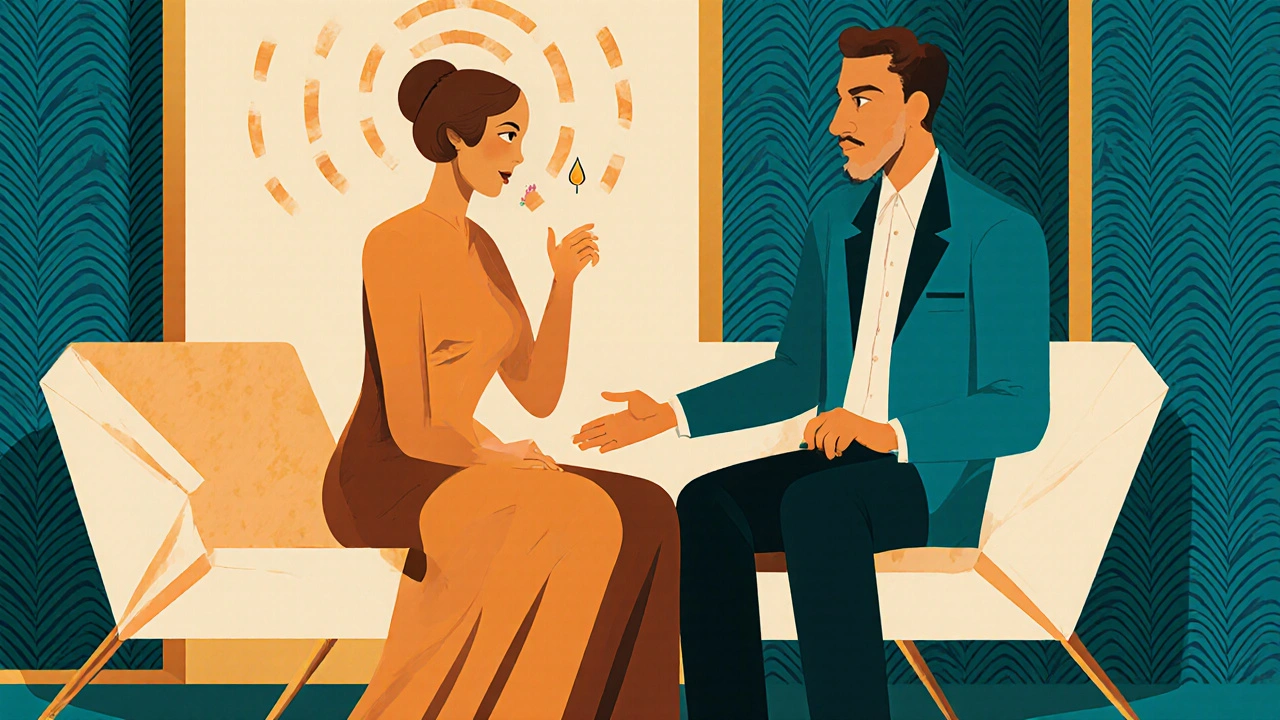Menopause Relationship Health Calculator
How Strong Is Your Relationship?
Answer these 5 questions to assess how well you're navigating menopause together. Your score reveals personalized strategies for improvement.
When Menopause hits the radar, it often feels like the whole partnership is under a microscope. One partner’s body is shifting, the other’s expectations may not, and suddenly everyday moments can feel tense. menopause isn’t just a personal health phase - it rewires emotions, sleep, and even the bedroom, pulling the whole relationship into the mix.
Understanding the Emotional Landscape
First, recognize that the emotional roller‑coaster isn’t a character flaw. Hormone Therapy, lifestyle, and genetics shape how intense mood swings become. Women often report spikes in irritability, anxiety, or sudden sadness, while partners may feel bewildered or blamed. The key is to view these feelings as symptoms of a transition, not personal attacks.
Physical Symptoms that Impact the Couple
Hot flashes, night sweats, and Sleep Disturbances are the headline act. A woman waking up drenched can leave the bed cold, prompting a partner to crawl into a separate blanket or even a different room. Sexual Intimacy may also shift as vaginal dryness and decreased libido set in. These physical changes ripple through the relationship, affecting emotional closeness and daily routines.
Open Communication: The Cornerstone
Clear, compassionate dialogue beats guessing games every time. Schedule a relaxed “check‑in” - maybe over tea after work - where both partners can share what’s working and what’s stressing them. Use “I” statements, such as “I feel…”, instead of “You always…”. Listening without trying to fix right away validates feelings and builds trust.

Medical Options and Their Relational Effects
When Hormone Therapy (HT) or non‑hormonal meds are on the table, involve the partner in the conversation. Understanding side‑effects, dosage, and expected timelines reduces surprise. Some studies show that couples who discuss treatment together report higher satisfaction and fewer misunderstandings during the adjustment period.
Lifestyle Tweaks That Help Both Partners
Simple habits can ease the transition for the whole household. Regular aerobic exercise, a balanced diet rich in phytoestrogens, and mindfulness practices lower stress hormones. Even a shared yoga session can turn a symptom‑focused conversation into a bonding experience.
When to Seek Professional Help
If conflicts linger beyond a few months, or if anxiety and depression surface, a therapist specialized in Relationship Dynamics can offer tools: couples counseling, sex therapy, or individual CBT. Early intervention prevents resentment from building up.
Comparison of Coping Strategies
| Strategy | Effectiveness | Ease of Implementation | Typical Cost |
|---|---|---|---|
| Open Communication Sessions | High | Very Easy | Free |
| Hormone Therapy | Medium‑High | Requires Medical Supervision | Moderate (£30‑£80 per month) |
| Lifestyle Changes (exercise, diet) | Medium | Easy‑Moderate | Low to Moderate |
| Couples Counseling | High | Moderate (schedule needed) | Moderate‑High (£50‑£120 per session) |
| Sex Therapy | High for intimacy issues | Moderate | Moderate‑High |
Quick Checklist for Couples
- Set a weekly “relationship hour” to discuss symptoms and feelings.
- Track physical changes in a shared journal - hot flashes, sleep quality, mood.
- Explore medical options together; bring a partner to the doctor’s appointment.
- Introduce at least one joint physical activity each week.
- Seek professional counseling if tension persists for more than three months.
Frequently Asked Questions
Can menopause affect my partner’s mood?
Yes. Watching a loved one endure hot flashes, sleep loss, or mood swings can be stressful. Partners often feel helpless, frustrated, or anxious, which may manifest as irritability. Open dialogue and shared coping strategies help mitigate these secondary effects.
What if intimacy drops during menopause?
Reduced libido and vaginal dryness are common. Using lubricants, exploring new forms of closeness (massage, cuddling), or discussing HT with a doctor can restore comfort. Couples therapy focused on sexual intimacy also provides practical exercises.
How soon should we talk to a professional?
If arguments become frequent, sleep loss hurts daily functioning, or either partner feels depressed for more than six weeks, it’s wise to consult a therapist. Early intervention prevents long‑term resentment.
Do lifestyle changes really help?
Yes. Regular cardio, a diet high in fruits, vegetables, and soy can lessen hot flashes by up to 30 % in some studies. Mind‑body practices like meditation lower cortisol, which in turn eases mood swings.
Is hormone therapy safe for my relationship?
When prescribed appropriately, HT can improve sleep, mood, and libido, offering a net benefit. Discuss risks (e.g., blood clotting, breast cancer history) with a clinician and involve your partner in the decision‑making.


Margaret pope
October 18, 2025 AT 12:30First off remember you’re not alone in this transition. Your body is doing a lot of work and it’s okay to feel out of sync. Talk to your partner openly and set a regular check‑in time. Little victories like a cool night or a calm mood deserve celebration. Keep a shared journal so both of you can see patterns and progress. If you notice persistent sadness, consider a gentle walk together and a cup of tea. Over time the waves will smooth out
Liberty Moneybomb
November 1, 2025 AT 13:26What the article fails to mention is the hidden agenda behind so‑called “open communication” – the industry that profits from our discomfort. Every time you schedule a “check‑in” they’re selling you another guided journal that promises bliss but drains your wallet. The subtle coercion stays under the radar while they harvest our anxiety for data. It’s unsettling how quickly we accept these scripts without questioning the power dynamics at play. Don’t be fooled by the smile of the therapist who’s really a data miner in disguise. Your relationship deserves authenticity, not a manufactured narrative fed by corporate interests. Stay vigilant and guard your intimacy from the silent corporate hand
Alex Lineses
November 18, 2025 AT 22:06Let’s parse the variables you introduced and reframe them within a biopsychosocial model. The so‑called “hidden agenda” can be operationalized as an extrinsic motivator influencing dyadic coping strategies. By employing a collaborative goal‑setting matrix you can mitigate extrinsic pressures and internalize intrinsic motivation. Incorporate evidence‑based communication protocols such as active listening loops and reflective summarization to enhance relational bandwidth. Monitoring physiological markers like cortisol alongside self‑reported mood scales creates a feedback loop for iterative adjustments. This integrative approach preserves agency while aligning therapeutic interventions with both partners’ value systems. In practice, a weekly debrief anchored in SMART objectives will translate abstract concerns into actionable outcomes
Brian Van Horne
December 6, 2025 AT 06:46Observing the phenomenology of menopausal transition reveals a predictable alteration in thermoregulatory set‑points and affective tone. It is advisable to implement climate‑control measures and scheduled nocturnal hydration. Such mitigations constitute low‑effort interventions with measurable benefit.
Norman Adams
December 23, 2025 AT 15:26Ah, the ever‑so‑refined counsel of climate control-how avant‑garde. One might as well suggest pairing a silk blanket with a symphony of violins to quell the nocturnal tempest. Clearly, the pinnacle of therapeutic innovation resides in thermostat tinkering. Congratulations on redefining holistic care with such groundbreaking simplicity.
Matthew Miller
January 10, 2026 AT 00:06Hey team! Let’s turn these hot flashes into a dance party- crank the music, grab a fan, and move! A burst of cardio right after a warm night can reset your core temp and boost endorphins. Remember, every sweaty moment is just fuel for the next victory lap. Keep the energy high and the vibes positive!
Stephanie Zaragoza
January 27, 2026 AT 08:46First, let us acknowledge the enthusiasm you exude, which, while commendable, borders on the simplistic treatment of a complex physiological process. Menopause, as a multifaceted endocrine transition, cannot be dismissed as merely an opportunity for spontaneous dance; it demands a rigorous, evidence‑based approach. Numerous peer‑reviewed studies have demonstrated that aerobic exercise, when structured with progressive overload, yields statistically significant reductions in vasomotor symptoms (p < 0.05). Moreover, the timing of such activity relative to circadian rhythms influences cortisol modulation, thereby affecting mood stability. It is essential, therefore, to integrate a periodized training program, rather than sporadic bursts of enthusiasm, to achieve sustainable outcomes. Additionally, dietary considerations-including phytoestrogen intake, omega‑3 fatty acid supplementation, and reduction of refined sugars-must be meticulously calibrated, as they interact synergistically with hormonal fluctuations. Hydration status, often overlooked, plays a pivotal role in thermoregulation; inadequate fluid consumption can exacerbate the intensity of hot flashes. Sleep hygiene, encompassing consistent bedtime routines, dim lighting, and avoidance of stimulants after 6 p.m., constitutes another cornerstone of comprehensive management. Psychological support, through validated cognitive‑behavioral frameworks, further ameliorates anxiety and depressive symptomatology. It would be remiss not to address the potential side effects of hormone therapy, which, while beneficial for many, carries contraindications that must be evaluated on an individual basis. Engaging both partners in joint counseling sessions fosters relational resilience and mitigates the risk of miscommunication. Finally, regular monitoring through validated questionnaires, such as the Menopause Rating Scale, ensures that therapeutic adjustments are data‑driven. In summary, while your vivacious spirit is appreciated, it should be channeled into a structured, multidisciplinary regimen that respects the complexity of the menopausal transition. Remember, consistency outweighs intensity when striving for hormonal equilibrium. Adhering to these protocols not only alleviates physical discomfort but also strengthens the partnership through shared purpose.